
Fritillaria (fritillaries) is a genus of spring flowering herbaceous bulbous perennial plants in the lily family (Liliaceae). The type species, Fritillaria meleagris, was first described in Europe in 1571, while other species from the Middle East and Asia were also introduced to Europe at that time. The genus has about 130–140 species divided among eight subgenera. The flowers are usually solitary, nodding and bell-shaped with bulbs that have fleshy scales, resembling those of lilies. They are known for their large genome size and genetically are very closely related to lilies. They are native to the temperate regions of the Northern hemisphere, from the Mediterranean and North Africa through Eurasia and southwest Asia to western North America. Many are endangered due to enthusiastic picking.
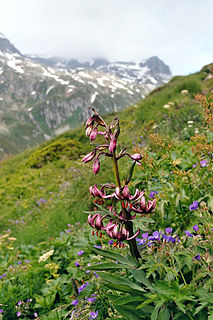
The lily family, Liliaceae, consists of about 15 genera and 610 species of flowering plants within the order Liliales. They are monocotyledonous, perennial, herbaceous, often bulbous geophytes. Plants in this family have evolved with a fair amount of morphological diversity despite genetic similarity. Common characteristics include large flowers with parts arranged in threes: with six colored or patterned petaloid tepals arranged in two whorls, six stamens and a superior ovary. The leaves are linear in shape, with their veins usually arranged parallel to the edges, single and arranged alternating on the stem, or in a rosette at the base. Most species are grown from bulbs, although some have rhizomes. First described in 1789, the lily family became a paraphyletic "catch-all" (wastebasket) group of petaloid monocots that did not fit into other families and included a great number of genera now included in other families and in some cases in other orders. Consequently, many sources and descriptions labelled "Liliaceae" deal with the broader sense of the family.

Fritillaria liliacea, the fragrant fritillary, is a threatened bulbous herbaceous perennial plant in the lily family Liliaceae. It is native to the region surrounding San Francisco Bay in California, USA.
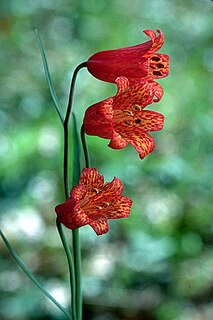
Fritillaria recurva, the scarlet fritillary, is a North American bulb-forming herbaceous perennial plant in the lily family Liliaceae. It is native to the western United States, from southwest Oregon down to northern California where it grows in the Klamath Mountains, Northern Coast Ranges, Cascade Range, and Sierra Nevada. Most of the known Californian locations are in the northern half of the state, as far south as Solano and El Dorado Counties, but there are isolated populations in Tulare and Mariposa Counties. The species has also been reported from Douglas and Washoe Counties in Nevada. It grows in dry, open woodlands and chaparral at 300–2,200 metres (980–7,220 ft), and it blooms in spring from February to July.

Fritillaria glauca is a species of fritillary known by the common names Siskiyou fritillary and Siskiyou missionbells.
Fritillaria micrantha, the brown fritillary or brown bells, is a Californian species of flowering plant in the lily family Liliaceae.
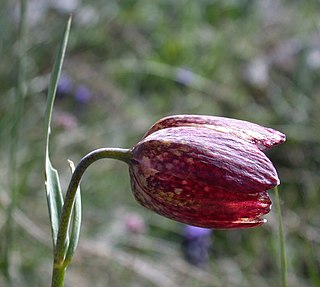
Fritillaria orientalis is a Eurasian species of monocotyledonous plant in the lily family Liliaceae. It was described by Johann Friedrich Adam in 1805, based on specimens collected in Ossetia.

Fritillaria graeca is a European plant species in the lily family Liliaceae. It is native to the Balkans. Some older literature says that the plant can also be found in Serbia, but all these collections are of var. gussichiae, now regarded as a distinct species called Fritillaria gussichiae.

Fritillaria purdyi, the Purdy's fritillary, is a rare species of flowering plant in the lily family Liliaceae.
Fritillaria messanensis is a European species of flowering plant in the lily family Liliaceae, native to southeastern Europe: Italy, Greece, Albania, former Yugoslavia.
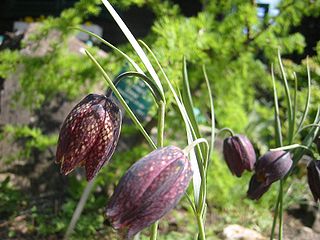
Fritillaria montana is a European species of flowering plant in the lily family Liliaceae, native to southern and eastern Europe: France, Italy, Greece, Austria, Hungary, Yugoslavia, Albania, Bulgaria, Romania, Ukraine, European Russia.

Fritillaria macedonica is a European species of flowering plant in the lily family Liliaceae, native to Albania, North Macedonia and Serbia.

Fritillaria gibbosa is a species of herbaceous perennial plant in the lily family Liliaceae. It is native to Afghanistan, Iran, Pakistan, Turkmenistan, and Transcaucasia.
Fritillaria meleagroides is a Eurasian species of flowering plant in the lily family Liliaceae, native to Xinjiang, Russia, Kazakhstan, Ukraine, and Bulgaria.
Fritillaria monantha is a Chinese plant species in the lily family Liliaceae. It is found only in China, in the Provinces of Anhui, Henan, Hubei, Jiangxi, Sichuan, and Zhejiang.
Fritillaria taipaiensis is a flowering plant species in the lily family Liliaceae. It is found only in China, in the Provinces of Gansu, Hubei, Shaanxi and Sichuan.
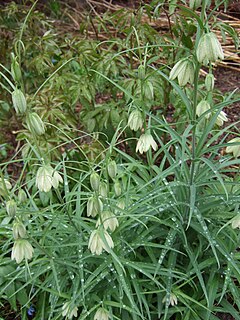
Fritillaria thunbergii is a flowering plant species in the lily family Liliaceae. It is native to Kazakhstan and in Xinjiang Province of western China, though cultivated in other places and naturalized in Japan and in other parts of China.
Fritillaria tortifolia is a flowering plant species in the lily family Liliaceae. It is found only in the northwestern part of Xinjiang Province, the extreme northwestern corner of China.

Fritillaria rhodia, called the Rhodian fritillary, is a Greek species of plant in the lily family Liliaceae. The only known wild populations are on the Island of Rhodes in the Aegean Sea, although the species has been cultivated elsewhere.

Fritillaria rhodocanakis is a species of plant in the lily family Liliaceae. In its pure form, it is found only on Hydra Island and on small neighboring islands in Greece. Additional populations occur in the Peloponnisos region of mainland Greece, though the specimens there show some degree of hybridization with F. spetsiotica and F. graeca. In 1987, some of the hybrids were described with the name Fritillaria rhodocanakis subsp. argolica, but this is now generally referred to as Fritillaria × spetsiotica Kamari.














